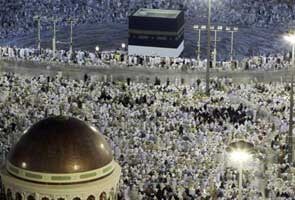
Mecca:
They might wear the humble white sheets required for Islam's haj pilgrimage, but for many visitors thronging Mecca's streets, the perfect souvenir of their trip is that most glittering of commodities: gold.
For most pilgrims, haj represents the fulfilment of a lifelong ambition and many of them want to commemorate their journey with keepsakes or gifts for relatives that carry a special religious significance.
Pilgrims from smaller, less cosmopolitan places than Mecca, also find gold jewellery to be cheaper, of better quality and more elaborate than what is available at home, creating a thriving annual market for the precious metal.
"The designs are beautiful. Everything is beautiful. I am confused which ones to pick," said Ijlal Suleiman, 35, from Sudan.
But after bargaining with a gold salesman, she decided to move to the next shop to sample other designs.
Dozens of gold shops lie just outside the Grand Mosque, Islam's holiest site, and their shelves and windows sparkle with bracelets, necklaces, rings, earrings, lockets and chains engraved with traditional Middle Eastern and Indian designs.
Prices of unworked gold are similar to those in Dubai, a regional jewellery hub, with 24-carats going for 204 UAE dirhams a gram in the emirate, according to www.uaegoldpricetoday.com, and 215 riyals in Mecca, said a shopkeeper.
Most of the jewellery is manufactured in Saudi Arabia's Red Sea port city of Jeddah from 21-carat gold, while pieces with Indian designs are imported through Dubai, said Ali Abdullah, 35, a Saudi who has been working in a gold shop in Mecca for 10 years.
"The gold sold in Mecca is pure and not tampered with," he said. "The Saudi gold is the best in the world. Its quality is high and it's blessed. People buy gold and say this is blessed gold from Mecca."
Unlike the white gold studded with diamonds and precious stones on display in Dubai's glitzy shopping malls, gold in Mecca's markets hardly has any additions which is more attractive to customers who buy it as an investment.
"The gold here is good in terms of its weight and manufacturing," said Mohammed Idrisur Rahman, 57, a lawyer from Bangladesh, as he bought two lockets for his daughter and daughter-in-law. "It is solid gold and the price is good and it's bought from a holy place."
For distant relatives less shiny but highly sought after gifts would suffice, Rahman said. That includes prayer beads and zamzam water, pumped from a holy well in Mecca.
However, not all pilgrims see their purchases as religious.
"I don't believe in blessing nonsense. Gold is good, it's better than buying fabrics and clothes," said Haj Namen, 47, from Iraqi Kurdistan after buying $2,450 worth of gold for his wife at home.
"If you are away from your wife for a month you have to get her some gold," said Najem, who has performed haj consecutively for the past 12 years as part of his job as a tour operator.
For most pilgrims, haj represents the fulfilment of a lifelong ambition and many of them want to commemorate their journey with keepsakes or gifts for relatives that carry a special religious significance.
Pilgrims from smaller, less cosmopolitan places than Mecca, also find gold jewellery to be cheaper, of better quality and more elaborate than what is available at home, creating a thriving annual market for the precious metal.
"The designs are beautiful. Everything is beautiful. I am confused which ones to pick," said Ijlal Suleiman, 35, from Sudan.
But after bargaining with a gold salesman, she decided to move to the next shop to sample other designs.
Dozens of gold shops lie just outside the Grand Mosque, Islam's holiest site, and their shelves and windows sparkle with bracelets, necklaces, rings, earrings, lockets and chains engraved with traditional Middle Eastern and Indian designs.
Prices of unworked gold are similar to those in Dubai, a regional jewellery hub, with 24-carats going for 204 UAE dirhams a gram in the emirate, according to www.uaegoldpricetoday.com, and 215 riyals in Mecca, said a shopkeeper.
Most of the jewellery is manufactured in Saudi Arabia's Red Sea port city of Jeddah from 21-carat gold, while pieces with Indian designs are imported through Dubai, said Ali Abdullah, 35, a Saudi who has been working in a gold shop in Mecca for 10 years.
"The gold sold in Mecca is pure and not tampered with," he said. "The Saudi gold is the best in the world. Its quality is high and it's blessed. People buy gold and say this is blessed gold from Mecca."
Unlike the white gold studded with diamonds and precious stones on display in Dubai's glitzy shopping malls, gold in Mecca's markets hardly has any additions which is more attractive to customers who buy it as an investment.
"The gold here is good in terms of its weight and manufacturing," said Mohammed Idrisur Rahman, 57, a lawyer from Bangladesh, as he bought two lockets for his daughter and daughter-in-law. "It is solid gold and the price is good and it's bought from a holy place."
For distant relatives less shiny but highly sought after gifts would suffice, Rahman said. That includes prayer beads and zamzam water, pumped from a holy well in Mecca.
However, not all pilgrims see their purchases as religious.
"I don't believe in blessing nonsense. Gold is good, it's better than buying fabrics and clothes," said Haj Namen, 47, from Iraqi Kurdistan after buying $2,450 worth of gold for his wife at home.
"If you are away from your wife for a month you have to get her some gold," said Najem, who has performed haj consecutively for the past 12 years as part of his job as a tour operator.
© Thomson Reuters 2012

